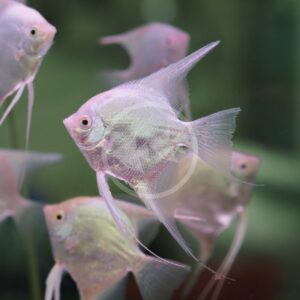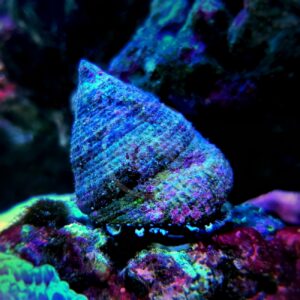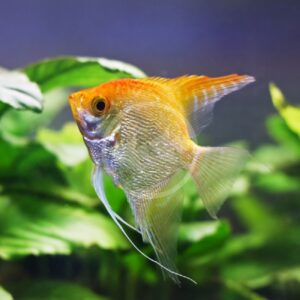
ANGELFISH – FW BLACK
Pterophyllum scalare
$6.99 – $49.99
The Freshwater (or FW) Black Angelfish is a color morph from the wild Silver ‘scalare‘ angelfish that has a large distribution across many river systems in South America. It is rare to encounter wild freshwater angelfish in the hobby, because they are now mass produced in captive-settings in Asia. For our store specifically, the majority of our freshwater angelfish are sourced locally from hobbyists right here in Wisconsin! Angelfish may be one of the most popular freshwater fishes in the hobby because of their elegant appearance, personality, numerous color morphs and compatibility. Do not forget that they are cichlids however, as these behaviors can become more obvious in peaceful community-type aquariums, particularly during breeding. Black angelfish can be variable in how pronounced their black coloration is, such that some individuals may appear duller than others. Additionally, some Black angelfish may have red irises, while others do not; this can also be a trait that comes with maturity. Angelfish are somewhat social and if acquired as juveniles, they are best kept in small groups of at least 4 to 6 individuals. The body of an adult Black angelfish can reach a size of approximately 6″ across, but they can be 8″ or taller in height once you account for their dorsal and anal fins. Angelfish, at any size, are difficult to sex unless they are in spawning behavior.
Care Level: Easy
Temperament: Semi-Aggressive
Live Plant Safe: Yes
General Description: The Freshwater (or FW) Black Angelfish is a color morph from the wild Silver ‘scalare‘ angelfish that has a large distribution across many river systems in South America. It is rare to encounter wild freshwater angelfish in the hobby, because they are now mass produced in captive-settings in Asia. For our store specifically, the majority of our freshwater angelfish are sourced locally from hobbyists right here in Wisconsin! Angelfish may be one of the most popular freshwater fishes in the hobby because of their elegant appearance, personality, numerous color morphs and compatability. Do not forget that they are cichlids however, as these behaviors can become more obvious in peaceful community-type aquariums, particularily during breeding. Black angelfish can be variable in how pronounced their black coloration is, such that some individuals may appear duller than others. Additionally, some Black angelfish may have red irises, while others do not; this can also be a trait that comes with maturity. Angelfish are somewhat social and if acquired as juveniles, they are best kept in small groups of at least 4 to 6 individuals. The body of an adult Black angelfish can reach a size of approximately 6″ across, but they can be 8″ or taller in height once you account for their dorsal and anal fins. Angelfish, at any size, are difficult to sex unless they are in spawning behavior.
Diet Requirements: Freshwater angelfish are far removed from their wild ancestors, therefore accepting most foods with no issue. A diet made up of various high quality vegetable based and protein based flake foods and sinking pellet foods are ideal, in addition to offering frozen foods such as bloodworms, brine shrimp, daphnia or any other mixed freshwater preparations. Variety is the spice of life in order to maintain color, immune function and longevity of your fish.
Care Requirements: An established minimum 30 gallon aquarium is ideal for a small group of juvenile Freshwater black angelfish. A larger group will require a bigger aquarium and the tank may need to be upgraded accordingly as the angelfish grow and pair off. Because of their size potential in terms of height, it is important to consider a generously tall aquarium footprint. For those looking to keep only a pair of juvenile angelfish, we recommend nothing less than a 30 gallon aquarium for these cichlids. Freshwater angelfish are intolerable of nitrite or ammonia spikes, and should not be introduced into a newly set-up aquarium. Biweekly water changes are encouraged to keep water parameters favorable (Nitrates < 30 ppm). Our tank-raised angelfish have a range of water parameters in which they can adapt to, but all prefer gentler water flow. The aquarium does not need to be aquascaped with anything in particular, but driftwood and other natural-looking arrangements will bring out the beauty of these angelfish. Freshwater angelfish have been observed to show exceptional coloration in aquariums that are well planted (live). Plants that grow taller, such as Amazon Swords (Echinodorus sp.), are a favorite. Incorporating flat surfaces, such as slate rock, will provide natural spawning areas for your angelfish once they’re able to breed. Black angelfish are overall relatively peaceful toward most tank mates, but they can squabble with each other. You can house different color morphs together successfully. Incompatible species that would harm angelfish and their decorative fins include, but are not limited to, Puntius barbs (Tiger, Black Ruby, Green Tiger), African cichlids, most Central American cichlids, and certain livebearers. Recommended water conditions, 76-86° F, KH 2-15, pH 6.0-7.5.
Purchase Size: Small: 1″ to 1-1/2”; Medium: 1-3/4″ to 2-3/4”; Large: 3″ to 3-3/4”; XLarge: 4” or larger.
Note: Your item may not look identical to the image provided due to variation within species. Purchase sizes are approximate.
Dry goods orders are shipped via US Postal Service or UPS to the address provided at checkout based on the selection made in your website shopping cart. Product is carefully packed to help prevent any damage during shipping. Once processed you will receive a shipment notification via email with tracking number, and delivery notification. Please allow 48 hours for processing after your order is placed.
Perishable items (i.e. live plants, refrigerated/frozen foods) are shipped via US Postal Service 2-3 day to the address provided at checkout for a $25.00 flat rate charge. Items are packed with secure packing material and heat, cold, or Cryo packs as needed to maintain safe temperatures during transit. If one or more perishable items are in the shopping cart at checkout the $25.00 perishable shipping charge will automatically appear and need to be selected. Once processed you will receive a shipment notification via email with tracking number. Please allow 48 hours for processing after your order is placed.
Livestock (i.e. fish, invertebrates, coral) are shipped via UPS Overnight to the address provided at checkout for a $55.00 flat rate charge. Livestock is packed in insulated styrofoam boxes with secure packing material and heat, cold, or Cryo packs as needed to maintain safe temperatures during transit. If one or more livestock items are in the shopping cart at checkout the $55.00 livestock shipping charge will automatically appear and need to be selected. Livestock is shipped Monday through Wednesday ONLY (no weekend delivery is available) weather permitting, and we reserve the right to delay shipping until conditions are appropriate for safe arrival. Once your order is placed we will contact you to arrange the best shipping date based on these criteria. Someone must be available to receive the livestock order on the first delivery attempt. Once processed you will receive a shipment notification via email with tracking number. Please allow 48 hours for processing after your order is placed.
For mixed dry goods/perishable & livestock orders items will be shipped via their corresponding shipping methods outlined above. Dry goods will be shipped via US Postal Service or UPS based on your selection and checkout, while livestock will ship via UPS Overnight for a $55.00 flat rate charge. You will receive separate notifications and tracking numbers for the dry goods and livestock. Please note due to different carriers and shipping methods dry goods and livestock may arrive on different days.
Related products
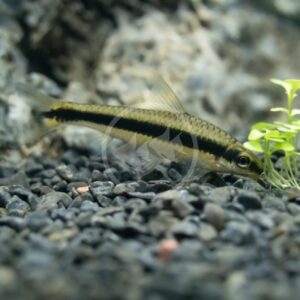
ALGAE EATER – SIAMESE / SAE
Crossocheilus oblongus
$7.99 – $24.99
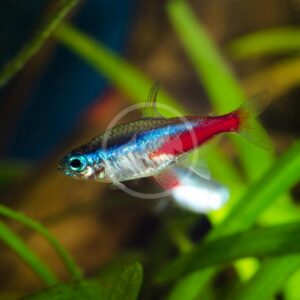
TETRA – NEON
Paracheirodon innesi
$6.99
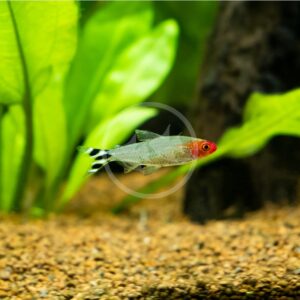
TETRA – RUMMYNOSE
Hemigrammus rhodostomuss
$9.99
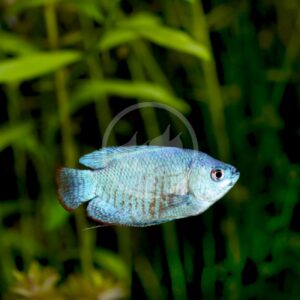
GOURAMI – DWARF POWDER BLUE
Trichogaster lalius
$11.99 – $16.99
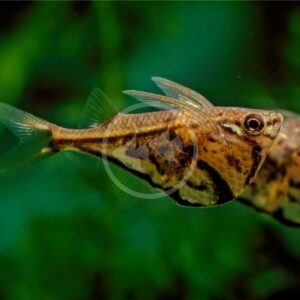
TETRA – HATCHETFISH MARBLE
Carnegiella strigata
$9.99
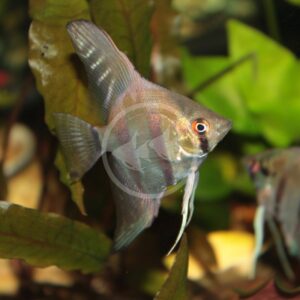
ANGELFISH – FW SILVER
Pterophyllum scalare
$9.99 – $39.99
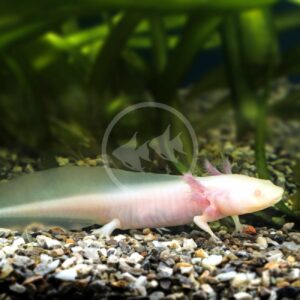
AXOLOTL – ALBINO
Ambystoma mexicanum
$99.99 – $149.99
